Earlier this week I was lucky enough to be able to attend a Masterclass by Professor Nikolas Rose titled ‘Social Sciences and the Self in the Age of the Brain’. Professor Rose has a long history in sociology, with a particular interest in the intersection between conceptions of the self and subjectivity with biomedicine. This is all underpinned by analyses of authority and power, and how our power systems interact and inform our concepts of the self.
The Masterclass included a morning of discussion with Professor Rose tackling these issues, following by some fascinating presentations from participants. Presentations included discussions on abortion law in Australia, the connection between perceptions of the self and music, the rise of ‘brain game’ devices and how these provide a sense of ‘brain training’, and a really fascinating talk on how women with autism interact with the medical system.
There is so much I could talk about this Masterclass, but I wanted to touch on some questions of medical authority that sparked in my mind.

At one point in the Masterclass we ended up debating and discussing the concept of leadership. We talked about how leadership has been given a psychological basis, with the concept being that leadership is an ‘inherent trait’, a trait that few are provided, and which is denied to others.
This discussion connected me back to an article I read a long time ago, titled “Leadership: An Alienating Social Myth” by Gary Gemmill and Judith Oakley. In this article Gemmill and Oakley argue that the very concept of leadership – the idea that our organisations, institutions, and broader society, require great leaders in order to survive — is a ‘myth’. This myth is one designed specifically in order to create and reinforce particular social structures and systems of power. As they argue:
“The social myth around leaders serves to program life out of people (non-leaders) who, with the social lobotimization, appear as cheerful robots (Mill, 1956). It is our contention that the myth making around the concept of leadership is, as Bennis arrests, and unconscious conspiracy, or social hoax, aimed at maintaining the status quo (Bennis, 1989).”
“Leadership theories espousing “traits” or “great person” explanations reinforce and reflect the widespread tendency of people to deskill themselves and idealise leaders by implying that only a select few are good enough to exercise initiative.”
What was interesting to me was connecting these concepts of leadership with medical authority. Throughout the masterclass we discussed the authority medical practitioners have in our society, with Professor Rose and one point commenting that for many ‘the drug a doctor provides is doctor’. Doctors and other medical practitioners have taken on particular ‘leadership’ roles in our society, given not just significant control over individual people’s health, but also increasingly over public policy and debate.
In many cases this is extremely important. We all value having the expertise of a doctor, who has studied at University for a very long time, when we get sick. We cannot all be experts in this area, and giving that expertise to those who can focus in on it makes total sense.
However, as discussed in the masterclass, this expertise also takes on particular power roles, ones that have and continue to be used, just like leadership, to reinforce particular social roles. Professor Rose focuses this inquiry specifically on the ‘psy’ medical professions – psychology, psychiatry etc etc. These practices of the brain have been integral to shaping our concept of subjectivity and the self, and then provide avenues for which to exclude or punish those who do not meet collectively agreed upon acceptable senses of self.
Professor Rose gave as an example one of his first ever jobs, a teacher in a school in the United Kingdom for ‘maladjusted students’. Professor Rose interrogated the very concept of ‘maladjustment’, questioning the biomedical explanations provided for this ‘condition’. The concept of ‘maladjustment’ Professor Rose said was based in biomedical understandings (i.e. that these kids were inherently maladjusted), giving medical authority to the exclusion of these students in to what was likely a poorly funded and supported school. In doing so it ignored the social causes behind these kid’s behaviour, in turn ignoring the possibility that their behaviour may actually be 100% reasonable given their circumstances.
This sort of medical authority is common in our society. One only needs to look at the way homosexuals and other ‘sexual deviants’ have been treated by mainstream capitalist society – whether it is through the classification of homosexuality as a mental illness, or the castration of sexual deviants – as active uses of medical authority to enforce particular social norms. The oppression of sexual minorities has, at least for the past 100 years, been inherently based in medical language and acts – an act of using the trust, authority and expertise of medical practitioners as a way to justify minority oppression.
However, as we are able to challenge dominant ideas of leadership, we also have the capacity to challenge these conceptions of medical authority as well. The best example I can find of this is the HIV/AIDS crisis in the 1980s. In this instance the issue was not medical practitioners using their trade to actively oppress minority groups (although that certainly did occur), but rather those in power often refusing to act either fast enough or with enough intent to halt the crisis (note that this is not an attack on individual medical practitioners, but rather on those who held significant power and did little to act on a major epidemic). Put simply, unlike many other epidemics, many of the powerful medical authorities, particularly in the United States, dragged their heals on HIV/AIDS, holding up life-saving treatments at times when they were desperately needed. This scenario is a perfect example of the use of an illness to attack a minority group, and then the withholding of medical intervention as a way to deny a solution to the problem. It is a clear use of medical authority to attack a minority group.
What we saw in response was the very use of this authority as a counterpoint. Receiving no joy from many in positions of power, HIV/AIDS activists and sufferers, sought out that authority themselves. People learned about the disease and drugs to deal with it, set up ‘buyer’s clubs’, and presented medical arguments to those in power in order to create change. They usurped the authority of the medical profession and took it for themselves when they needed it.
This in many ways was successful, finally pushing those in power to take the epidemic more seriously, to provide more funding, and to eventually get us to the point where HIV/AIDS has become manageable in Western Countries.
However it also has side effects. Professor Rose noted that one of the side effects of this approach was that it created an increasing focus on individual responsibility for health issues. The authority of doctor’s broke down to a point we are increasingly seeing where they are no longer considered the key point-person of an individual’s health, with ‘individual responsibility’ taking a much larger role. This has positives and negatives – while some authority has been usurped from medical practitioners, it also often places this authority and responsibility into the hands of those who may not have the capacity or skills to implement it.
What we are seeing though clearly is a break down in much of the medical authority in our society, coming at a time of a breakdown in other forms of authority structures, in particular the political class. The question is, what does this look like? The side effect of this break down of authority is that we are all taking more ‘control’ over our health and medical decisions. We all have to work on our own to fix our health, or we face punishment. But this does not seem to be that much of a solution either, as it once again ignores the inherent power structures that allow for authority structures to help shape our concept of the self. In fact one could argue that the provision of ‘individual responsibility’ in health matters is once again the implementation of medical authority structures – with this time medical approaches being used to enforce strict concepts of individualism. It is not a community approach to health, but rather a competitive individualist one, one where if you fail doing it by yourself you are then left behind.
This role of authority in creating concepts of individuality and concepts of the self is something I will be exploring more as I undertake my research. It is clear Professor Rose is someone I will have to continue reading. This masterclass was great, and I look forward to exploring these issues further.
 It’s official. Australians have voted in favour of marriage equality!
It’s official. Australians have voted in favour of marriage equality!
 This is a talk I did as part of ACT Fair Day, in conjunction with
This is a talk I did as part of ACT Fair Day, in conjunction with  This talk was presented at Queer Stories in August. Queer Stories is a monthly queer story-telling event held at Giant Dwarf in Redfern, Sydney every month. The event is really great, and I encourage everyone to head along.
This talk was presented at Queer Stories in August. Queer Stories is a monthly queer story-telling event held at Giant Dwarf in Redfern, Sydney every month. The event is really great, and I encourage everyone to head along.  Earlier this week the vote yes campaign received some amazing news. New polling from Essential Research highlighted a significant enthusiasm gap between yes and no voters.
Earlier this week the vote yes campaign received some amazing news. New polling from Essential Research highlighted a significant enthusiasm gap between yes and no voters.  “Stop the fags”
“Stop the fags” Last week the TV adaptation of The Handmaid’s Tale was released on SBS. In doing so the show has revilatised Margaret Atwood’s classic 1985 novel, being considered in many ways a prescient story to tell in our current political climate.
Last week the TV adaptation of The Handmaid’s Tale was released on SBS. In doing so the show has revilatised Margaret Atwood’s classic 1985 novel, being considered in many ways a prescient story to tell in our current political climate. Over recent times, particularly since the plebiscite and Safe Schools debates within Australia, I have noticed a strong narrative of ‘suffering’ and ‘vulnerability’ within large parts of the queer community. Mainstream queer discourse has increasingly turned towards defining queer people as ‘vulnerable’, ones who have ‘suffered’ a great ‘injury’, and whose main quest is for those injuries to be fixed in some way. I have spoken about this issue in
Over recent times, particularly since the plebiscite and Safe Schools debates within Australia, I have noticed a strong narrative of ‘suffering’ and ‘vulnerability’ within large parts of the queer community. Mainstream queer discourse has increasingly turned towards defining queer people as ‘vulnerable’, ones who have ‘suffered’ a great ‘injury’, and whose main quest is for those injuries to be fixed in some way. I have spoken about this issue in  This lecture was given to the GEND1001 class at the Australian National University in
This lecture was given to the GEND1001 class at the Australian National University in  This speech was presented as part of the Noted Festival Event on Thursday the 5th of May: ‘AIDS Action Council presents Gay Sex is Fun’.
This speech was presented as part of the Noted Festival Event on Thursday the 5th of May: ‘AIDS Action Council presents Gay Sex is Fun’.